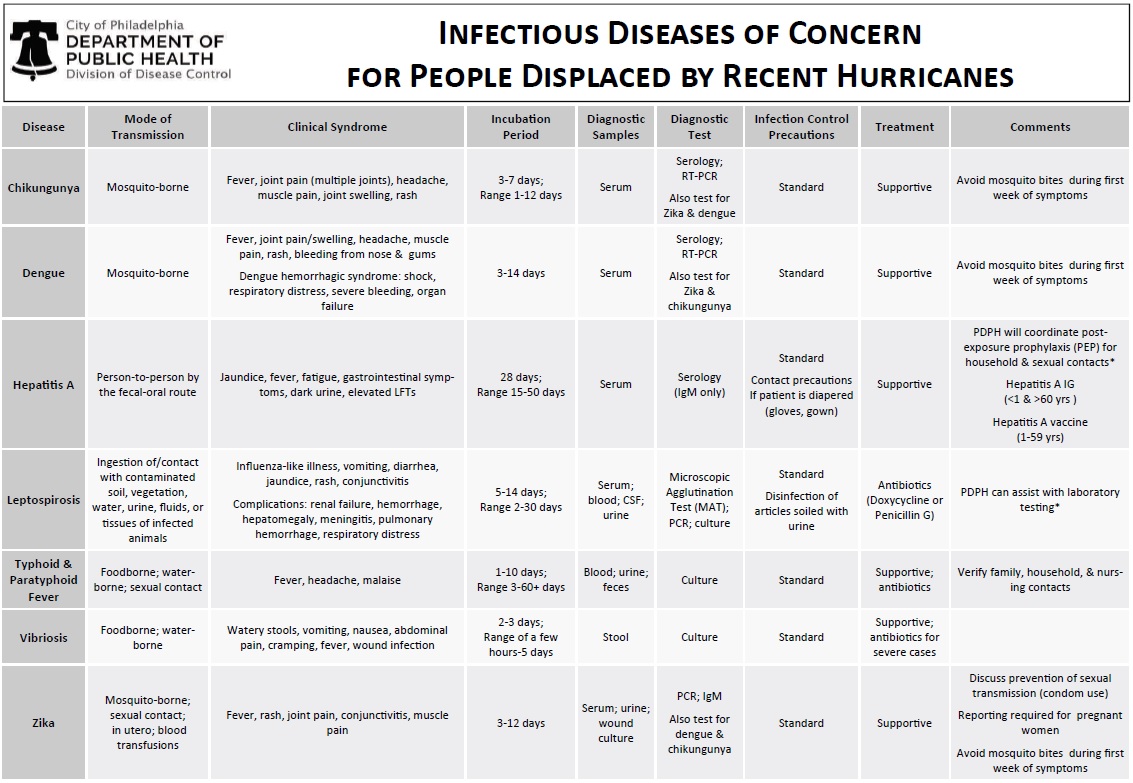Recent hurricanes affecting Puerto Rico and other island communities in the Caribbean have led to severe prolonged disruption of infrastructure and electricity increasing the risk of several infectious diseases. People from this part of the world have been gradually resettling to Philadelphia over recent weeks and more may arrive in the coming months. The Philadelphia Department of Public Health (PDPH) Division of Disease Control is issuing this Health Advisory to raise awareness among clinical providers for the potential for importation of rare, tropical diseases and other enteric and waterborne conditions due to loss of electricity and flood waters.
Diseases of Heightened Concern:
Natural disasters like Hurricanes Irma and Maria that result in extensive flooding and prolonged power outages, disrupt sewage treatment and access to clean drinking water, and cause food spoilage increasing the risk of gastroenteritis due to microorganisms. Diseases can include leptospirosis, hepatitis A, typhoid and paratyphoid fever, and vibriosis. Other, more typical pathogens should also be suspected and tested for based on clinical presentation and exposure histories (salmonella, shigella, E. coli, etc.). Diseases transmitted by mosquitos can also increase following prolonged periods of standing water. These include dengue, zika and chikungunya, viruses that are all endemic in Puerto Rico. Other presentations of illnesses associated with disasters and relocation of people through crowded shelters or transportation hubs include tetanus, pertussis and influenza, all of which can be prevented through vaccination. Clinicians treating patients from a disaster affected area should increase their understanding of these risks and management strategies.
Specific Recommendations for Clinicians:
- Become familiar with infectious diseases endemic to Puerto Rico and conditions caused by infrastructure disruption and flooding
- Take a travel history for all patients especially those who present with fever, rash, GI or severe respiratory illness to identify recent exposure to a disaster affected area
- Order appropriate diagnostic tests and follow treatment and disease control recommendations
- Report suspect and confirmed diseases to PDPH promptly
- Review immunization histories for all new patients and work to provide appropriate vaccines as soon as possible
Clinicians are encouraged to call the PDPH Division of Disease Control to report suspect cases, coordinate clinical specimen testing or for additional consultation to manage suspect and confirmed communicable diseases. Call during business hours (8:30 – 5:00) at 215-685-6740. Report urgent cases after hours by calling 215-686-4514 and ask for the Division of Disease Control person on call. Additional information for these diseases can be found from the CDC at: https://emergency.cdc.gov/han/HAN00408.asp

Originally released by the Philadelphia Department of Public Health on November 1, 2017.




